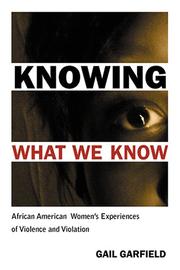| Listing 1 - 3 of 3 |
Sort by
|

ISBN: 0813537592 0813536596 081353660X 9780813537597 9780813536590 9780813536606 0813580455 9780813580456 Year: 2005 Publisher: New Brunswick, NJ
Abstract | Keywords | Export | Availability | Bookmark
 Loading...
Loading...Choose an application
- Reference Manager
- EndNote
- RefWorks (Direct export to RefWorks)
In recent years there has been an attempt by activists, service providers, and feminists to think about violence against women in more inclusive ways. In Knowing What We Know, activist and sociologist Gail Garfield argues that this effort has not gone far enough and that in order to understand violence, we must take the lived experiences of African American women seriously. Doing so, she cautions, goes far beyond simply adding voices of black women to existing academic and activist discourses, but rather, requires a radical shift in our knowledge of these women’s lives and the rhetoric used to describe them. Bringing together a series of life-history interviews with nine women, this unique study urges a departure from established approaches that position women as victims of exclusively male violence. Instead, Garfield explores what happens when women’s ability to make decisions and act upon those choices comes into conflict with cultural and social constraints. Chapters explore how women experience racialized or class-based violence, how these forms of violence are related to gendered violence, and what these violations mean to a woman’s sense of identity. By showing how women maintain, sustain, and in some instances regain their sense of human worth as a result of their experiences of violation, Garfield complicates the existing dialogue on violence against women in new and important ways.
African American women --- Violence against. --- Crimes against. --- Afro-American women --- Women, African American --- Women, Negro --- Women --- Interviews. --- Jordan, Barbara, --- Conversation --- Interviewing --- Jordan, Barbara Charline, --- African Americans --- Intellectual life. --- United States --- Civilization --- African American influences. --- African American intellectuals

ISBN: 9780739119488 Year: 2008 Publisher: Lanham Lexington Books
Abstract | Keywords | Export | Availability | Bookmark
 Loading...
Loading...Choose an application
- Reference Manager
- EndNote
- RefWorks (Direct export to RefWorks)
Jordan, Barbara --- Schroeder, Patricia --- Ferraro, Geraldine --- Dole, Elizabeth --- Mankiller, Wilma Pearl --- Clinton, Hillary Rodham --- Albright, Madeleine Korbel --- Whitman, Christine Todd
Book
ISBN: 1283150727 9786613150721 0226241327 Year: 2003 Publisher: Chicago : University of Chicago Press,
Abstract | Keywords | Export | Availability | Bookmark
 Loading...
Loading...Choose an application
- Reference Manager
- EndNote
- RefWorks (Direct export to RefWorks)
Thirty years ago there were nine African Americans in the U.S. House of Representatives. Today there are four times that number. In Going Home, the dean of congressional studies, Richard F. Fenno, explores what representation has meant-and means today-to black voters and to the politicians they have elected to office. Fenno follows the careers of four black representatives-Louis Stokes, Barbara Jordan, Chaka Fattah, and Stephanie Tubbs Jones-from their home districts to the halls of the Capitol. He finds that while these politicians had different visions of how they should represent their districts (in part based on their individual preferences, and in part based on the history of black politics in America), they shared crucial organizational and symbolic connections to their constituents. These connections, which draw on a sense of "linked fates," are ones that only black representatives can provide to black constituents. His detailed portraits and incisive analyses will be important for anyone interested in the workings of Congress or in black politics.
African Americans --- African American legislators --- Politics and government --- Jordan, Barbara, --- Stokes, Louis, --- Fattah, Chaka, --- Jones, Stephanie Tubbs, --- United States. --- Constituent communication --- representation, voters, black politicians, stephanie tubbs jones, chaka fattah, barbara jordan, louis stokes, district, capitol, legislators, politics, history, nonfiction, constituency, constituents, congress, communication, government, diversity, inclusion, influence, personal goals, experience, strategy, negotiation, connections, liberty hill baptist church, campaign, dewey street award program, party, protection, minority, race, racism, discrimination, bias, political science.
| Listing 1 - 3 of 3 |
Sort by
|

 Search
Search Feedback
Feedback About UniCat
About UniCat  Help
Help News
News